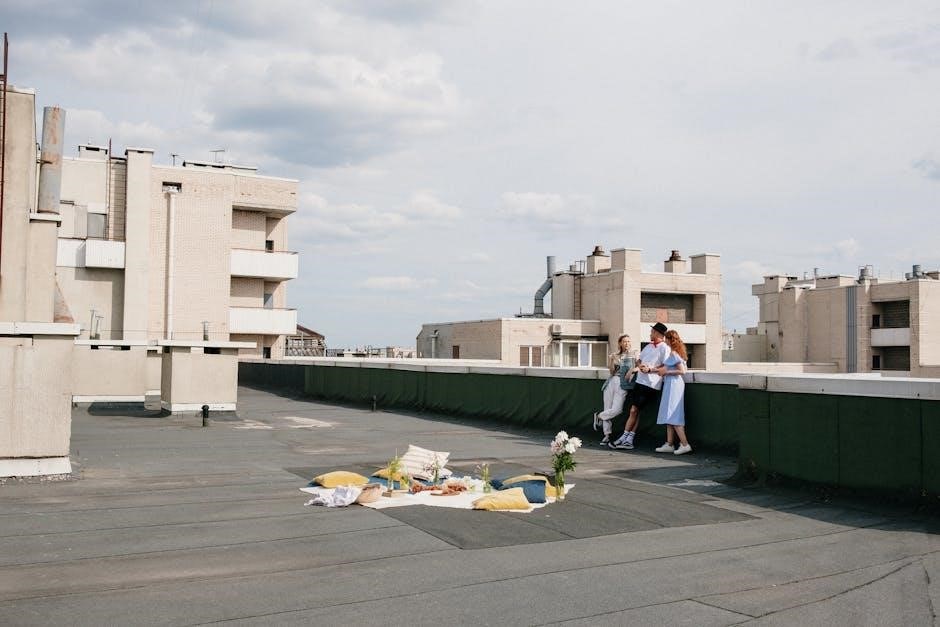Claudia Rankine’s Citizen: An American Lyric is a groundbreaking work blending poetry, prose, essays, and visual art to explore racism, identity, and daily experiences of Black consciousness in America.
Overview of Claudia Rankine’s Work
Claudia Rankine is a Jamaican-born poet, essayist, and playwright known for her innovative exploration of race, identity, and social justice. Her work often blends poetry, prose, and visual art to create a unique narrative voice. In Citizen: An American Lyric, Rankine examines the everyday experiences of Black Americans, offering a deeply personal yet universally resonant perspective. Her writing is both intimate and expansive, capturing the complexities of racism and belonging in contemporary society. Rankine’s work has been widely praised for its lyrical precision and its ability to confront uncomfortable truths with grace and clarity.
Genre and Structure of the Book
Claudia Rankine’s Citizen: An American Lyric defies traditional genres, seamlessly merging poetry, prose, essays, and visual art. The book’s structure is unconventional, with fragmented narratives that reflect the disjointed nature of racial experiences. Each section flows fluidly into the next, creating a dynamic interplay between text and image. This hybridity allows Rankine to explore themes like racism and identity through multiple lenses, offering a layered and immersive reading experience. The book’s innovative format challenges readers to engage with its content on both an emotional and intellectual level, making it a standout work in contemporary literature.
Themes Explored in Citizen
Claudia Rankine’s Citizen: An American Lyric examines themes of racism, identity, and microaggressions, blending personal and societal experiences to create a vivid exploration of Black consciousness and alienation;

Racism and Its Manifestations
Claudia Rankine’s Citizen: An American Lyric delves into the pervasive nature of racism, exposing its subtle and overt forms in daily life. Through prose, poetry, and visuals, Rankine captures the ways racism infiltrates interactions, from microaggressions to systemic injustices. The book explores how these encounters shape Black consciousness, creating a sense of alienation and internalized oppression. Rankine’s work highlights the emotional and psychological toll of racism, illustrating its insidious presence in both personal and societal contexts. By blending art and text, she challenges readers to confront the uncomfortable realities of racial inequality and its enduring impact on individuals and communities.
Identity and Belonging
Claudia Rankine’s Citizen: An American Lyric probes the complexities of identity and belonging, particularly for Black individuals in a society marked by racial hierarchies. Through personal narratives and cultural critiques, Rankine examines how systemic racism erodes a sense of self and fosters alienation. The book explores the tension between asserting one’s identity and the constant negotiation of spaces where belonging is contingent and fleeting. Rankine’s lyrical prose and multimedia elements illuminate the emotional labor of navigating these intersections, offering a powerful meditation on what it means to be seen, heard, and valued in America.
Microaggressions and Their Impact
Claudia Rankine’s Citizen: An American Lyric delves into the insidious nature of microaggressions, exposing how these subtle, often unintentional slights perpetuate racial inequality. Rankine illustrates their cumulative toll on Black individuals, revealing how they erode self-perception and reinforce systemic racism. Through personal vignettes and cultural critiques, she captures the emotional labor of navigating these everyday indignities, from casual racism in social settings to the presumptions of inferiority in professional spaces. The book underscores how microaggressions, though seemingly minor, are deeply wounding, perpetuating a sense of alienation and invisibility that resonates throughout Black consciousness.

Structure and Style
Claudia Rankine’s Citizen: An American Lyric blends poetry, prose, essays, and visual art, resisting traditional categories to create a unique, multimedia narrative exploring race and identity.
Hybridity of Poetry and Prose
Claudia Rankine’s Citizen: An American Lyric masterfully merges poetry and prose, creating a fluid narrative that transcends traditional literary forms. This hybridity allows for rich, layered storytelling, capturing the complexity and immediacy of lived experiences. By blending lyrical prose with poetic imagery, Rankine crafts a unique voice that resonates deeply, offering readers a poignant exploration of race, identity, and daily encounters with racism. The interplay between these forms not only challenges genre conventions but also mirrors the fragmented nature of Black consciousness, making the work both innovative and deeply affecting.
Role of Visual Art and Multimedia Elements
In Citizen: An American Lyric, visual art and multimedia elements play a pivotal role in amplifying the emotional and thematic resonance of the text. Rankine incorporates images, videos, and other visual media to interrupt and complement the prose, creating a multisensory experience. These elements often depict scenes of racial tension, everyday microaggressions, and the erasure of Black identity, offering a visceral counterpoint to the written narrative. By blending visual and textual languages, Rankine challenges readers to engage with racism and Black consciousness on multiple levels, fostering a deeper understanding of the complexities explored in the book.

Critical Reception and Impact
Claudia Rankine’s Citizen has garnered significant acclaim, sparking vital discussions in academic and cultural circles. Its exploration of race and identity has profoundly impacted contemporary literature.
Literary and Cultural Significance
Citizen: An American Lyric holds profound literary and cultural significance, blending prose and poetry to address race, identity, and societal inequities. Its innovative structure challenges traditional genres, resonating deeply with readers and scholars. The book has become a cornerstone in discussions about race and justice, fostering dialogue across academic and cultural platforms. Its exploration of Black consciousness and daily microaggressions offers a searing critique of American society. By merging personal narratives with broader societal issues, Rankine’s work has redefined contemporary poetry, making it a vital text for understanding race and identity in the modern world.
Reader Responses and Discussions
Citizen: An American Lyric has sparked widespread reader engagement, fostering conversations about race, identity, and societal justice. Its blend of personal narratives and societal critique resonates deeply, encouraging introspection and dialogue. The book has been featured in numerous discussions, including the NewsHour-New York Times book club, where Rankine addressed reader questions. Its inclusion in academic forums, such as Boston College’s Courageous Conversations series, highlights its ability to provoke meaningful reflection. Readers praise its accessibility and emotional depth, making it a catalyst for both personal and collective exploration of race and consciousness in America today.

Personal Reflections and Essays
Claudia Rankine’s Citizen: An American Lyric offers a deeply personal exploration of race, identity, and consciousness, blending poetic and prose reflections that resonate emotionally and intellectually.
Rankine’s Unique Voice and Perspective
Claudia Rankine’s unique voice in Citizen: An American Lyric captivates through its blend of poetry and prose, offering a raw, introspective exploration of race and identity. Her perspective, both deeply personal and universally relatable, challenges readers to confront the subtleties of racism and microaggressions in everyday life. By merging the lyrical with the topical, Rankine creates a narrative that feels both intimate and expansive, making her work a pivotal contribution to contemporary literature. Her ability to articulate the complexities of Black consciousness has resonated widely, solidifying her role as a leading voice in American letters.
Exploration of Black Consciousness
Citizen: An American Lyric delves deeply into the complexities of Black consciousness, examining the emotional and psychological toll of systemic racism. Through a mix of essays, poetry, and visual art, Rankine captures the nuances of Black life in America, offering a powerful critique of societal norms and individual experiences. The book explores themes of identity, belonging, and the persistent struggle for recognition, creating a space for dialogue about race and humanity. Rankine’s work not only reflects the collective pain of marginalized communities but also amplifies their voices, making it a vital exploration of contemporary Black consciousness.
Educational and Academic Use
Claudia Rankine’s Citizen: An American Lyric is widely adopted in university curricula for its exploration of race, identity, and social justice, inspiring critical discussions and workshops.
Adoption in University Curricula
Claudia Rankine’s Citizen: An American Lyric has been widely integrated into university syllabi across various disciplines, including English, sociology, and African American studies. Its unique blend of poetry, prose, and visual elements makes it a versatile teaching tool for exploring themes like race, identity, and social justice. Professors appreciate its ability to spark critical discussions and encourage students to reflect on their own experiences with microaggressions and systemic racism. The book’s relevance to contemporary issues has made it a staple in modern academic settings, fostering deeper understanding and empathy among students.

Workshops and Discussions Inspired by the Book
Claudia Rankine’s Citizen: An American Lyric has inspired numerous workshops and discussions nationwide, fostering dialogue on race, identity, and social justice. Universities and cultural organizations often host events where participants explore the book’s themes through writing exercises, group discussions, and multimedia presentations. For example, Boston College’s Courageous Conversations series and the NewsHour-New York Times book club have featured Citizen as a catalyst for deeper engagement with racial justice. These workshops encourage attendees to reflect on personal experiences and societal norms, creating a space for empathy and understanding. The book’s impact continues to resonate in these interactive settings, sparking meaningful conversations about equality and belonging.

Cultural and Historical Context
Claudia Rankine’s Citizen: An American Lyric captures the cultural and historical essence of race and identity in contemporary America, blending prose, essays, and art to reflect Black consciousness and societal tensions.

Contemporary Relevance of the Book’s Themes
Claudia Rankine’s Citizen: An American Lyric remains deeply relevant in today’s socio-political climate, addressing systemic racism, microaggressions, and Black consciousness with unflinching clarity. Its exploration of everyday racial encounters resonates amid ongoing discussions about racial justice and identity. The book’s themes align with movements like Black Lives Matter, highlighting the persistence of inequality. Rankine’s innovative blending of poetry, prose, and visual art offers a powerful lens through which to examine contemporary America’s racial landscape, making it a vital text for understanding the complexities of race and identity in the 21st century.
Connection to Social Justice Movements
Claudia Rankine’s Citizen: An American Lyric resonates deeply with contemporary social justice movements, particularly Black Lives Matter. The book’s exploration of systemic racism, police violence, and everyday microaggressions aligns with the movement’s goals of dismantling racial inequality. Rankine’s work amplifies the voices of Black individuals, shedding light on the emotional and psychological toll of racial discrimination. By blending personal narrative with broader societal critique, Citizen has become a powerful tool for fostering dialogue and inspiring action. Its themes of resistance and resilience continue to fuel conversations about justice, equality, and human dignity in America today.
Citizen: An American Lyric has left an indelible mark on American literature, reshaping conversations about race, identity, and justice. Its innovative form and unflinching honesty continue to inspire.

Long-Term Influence on American Literature

Claudia Rankine’s Citizen: An American Lyric has reshaped contemporary literature by blending poetry, prose, and visual art into a powerful exploration of race and identity. Its innovative structure challenges traditional genre boundaries, inspiring a new wave of hybrid works. The book’s unflinching examination of systemic racism and microaggressions has sparked crucial conversations, making it a cornerstone of modern American literary discourse. Its influence extends beyond academia, resonating with readers and fostering empathy and understanding. Citizen stands as a testament to the enduring power of literature to reflect and transform society.
Rankine’s Continuing Contribution to the Conversation
Claudia Rankine’s work extends far beyond Citizen, as she remains a pivotal voice in contemporary discussions on race, identity, and social justice. Through public lectures, essays, and collaborative projects, she continues to challenge societal norms and provoke introspection. Rankine’s unique ability to merge personal narrative with broader cultural critique has cemented her role as a thought leader. Her engagement with multimedia platforms and academic initiatives ensures her ideas reach diverse audiences, fostering dialogue and inspiring new perspectives. By consistently pushing boundaries, Rankine ensures her work remains central to ongoing conversations about equity and representation in America.
